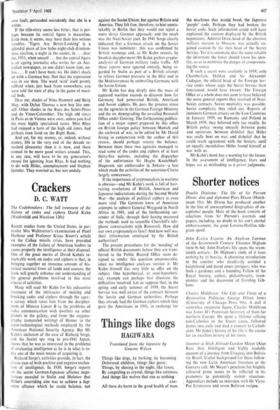Crackers
D. C. WATT
Recent studies from the United States, in par- ticular Mrs Wohlstetter's examination of Pearl Harbour and Professor Klaus Knorr's article on the Cuban missile crisis, have provided examples of the failure of American leaders to assess properly the intelligence at their disposal. One of the great merits of David Kalias, re- markable work on codes and ciphers is that, in bringing together an immense amount of his- torical material from all lands and sources, the book will greatly enhance our understanding of the general problems involved in this most crucial of activities.
Many will read Mr Kahn for his exhaustive treatment of the intricacies of making and breaking codes and ciphers through the ages: a survey which takes him from the decipher- ment of Minoan Linear B to the problems of radio communication with dwellers on other planets in the galaxy, and from the stegano- graphy (concealed writing) of Homer to the super-technological methods employed by the American National Security Agency. But Mr Kahn's inclusion of the case of Richard Sorge, and the Soviet spy ring in pre-1941 Japan, shows that he was as interested in the problems of evaluating intelligence as he is in what is to- day one of the main means of acquiring it.
Richard Sorge's activities provide, in fact, the classic case of both positive and negative evalua- tion of intelligence. In 1939, Sorge's reports on the secret German-Japanese alliance nego- tiations revealed to Stalin and Molotov that Hitler's overriding aim was to achieve a Jap- anese alliance which he could balance, not against the Soviet Union, but against Britain and America. They felt free, therefore, to hint unmis- takably in Berlin that they would not reject more direct German approach; and the result was the Nazi-Soviet pact. In 1941 Sorge clearly indicated that a German attack on the Soviet Union was imminent: this was confirmed by British warnings and, as Mr Kahn reveals, by Swedish decipherment (Mr Kahn prefers crypto- analysis) of German military radio traffic. All these reports were ignored entirely, being re- - garded by Stalin as part of a British attempt to relieve German pressure in the blitz and in the Mediterranean by embroiling Germany with the Soviet Union.
Mr Kahn has dug deeply into the mass of captured wartime records to discover how far Germany had penetrated British, American and Soviet ciphers. He puts the greatest stress on the agencies in the German Foreign Ministry and the ss, downgrading the so-called Research Office under Goering. The forthcoming publica- tion of a major report prepared by this office on British foreign policy between Munich and the outbreak of war, to be edited by Mr David Irving in conjunction with the author of this review, should perhaps restore the balance. Between them these two agencies managed to read 'some of the codes and ciphers of at least thirty-five nations, including the dispatches of the unfortunate Sir Hughe Knatchbull- Hugessen, our ambassador in Ankara—a feat which made the activities of the notorious Cicero largely unnecessary.
If the importance of cryptoanalysis in wartime is obvious—and Mr Kahn's work is full of hair- raising revelations of British, American and Japanese indiscretions during the Second World War—the analysis of political ciphers is even more vital. The Germans knew of American attempts to subvert General Weygand in North Africa in 1941, and of the forthcoming sur- render of Italy, through their having mastered the methods used to scramble Churchill's tele- phone conversations with Roosevelt. How did our own cryptoanalysts fare? And how well was their information employed by the British authorities?
The present procedures for the 'weeding' of official British documents before they are trans- ferred to the Public Record Office seem de- signed to render this question, unanswerable, since no intelligence analyses survive it. Mr Kahn himself has very little to offer on the subject. One hypothetical, or semi-hypotheti- cal, example can perhaps best illustrate the difficulties involved. Let us suppose that, in the spring and early summer of 1939, the Secret Service was well aware of the contacts between the Soviet and German authorities. Perhaps they already had the German ciphers which they gave the Americans in 1941, in exchange for the machines that would break the Japanese `purple' code. Perhaps they had broken the Soviet code. Such information could well have explained the caution displayed by the British negotiators. Admiral Drax, head of the abortive military mission to Moscow, was actually en- joined caution by the then hdad of the Secret Service. Yet it is axiomatic,that the more reliable the informant the fewer should know his iden- tity, so as to minimise the danger of compromis- ing the source.
If such a secret were available in 1939„ only Chamberlain, Halifax and Sir Alexander Cadogan, the official head of the Foreign Ser- vice under whose aegis the Secret Service then functioned, would have known. The Foreign Office as a whole does not seem to have believed the more general reports they received of Nazi- Soviet contacts. Soviet neutrality was possible. Soviet complicity they ruled out. Reports of imminent German attacks on the Low Countries in January 1939, on Rumania and Poland in March 1939, they believed only too readily. So British policy swung uneasily between panic and optimism, between disbelief that Hitler was really bent on war, and disbelief that he could reach agreement with the Soviets; until an equally incredulous Hitler found himself at war with us.
Mr Kahn's book has a warning for the future. In the assessment of intelligence, fears and hopes are as misleading as a priori judgments.














































 Previous page
Previous page